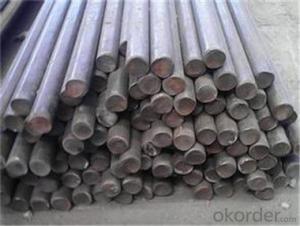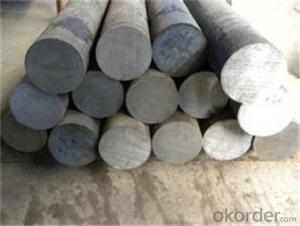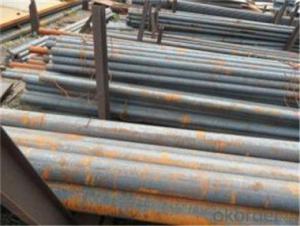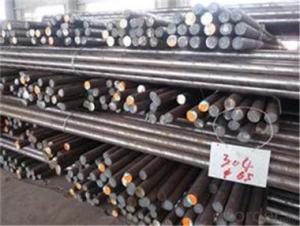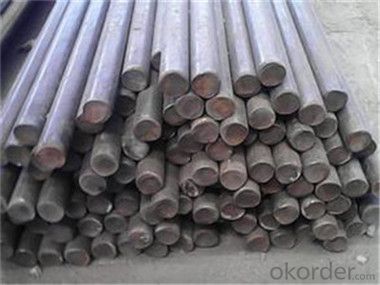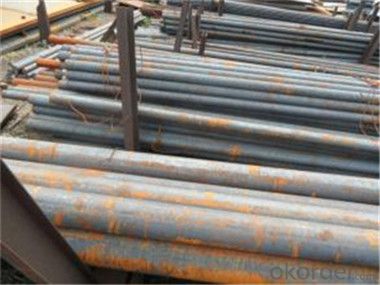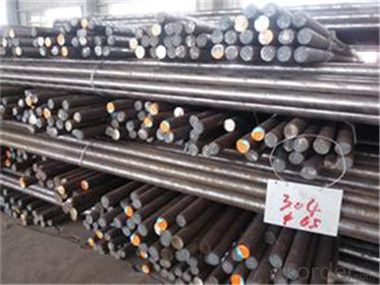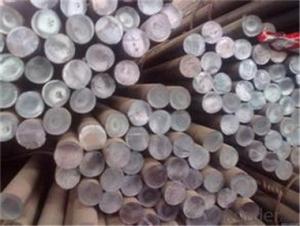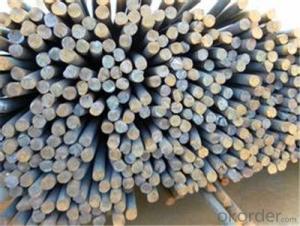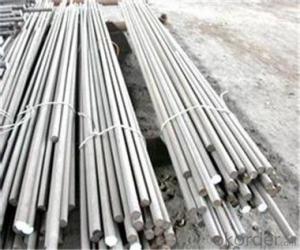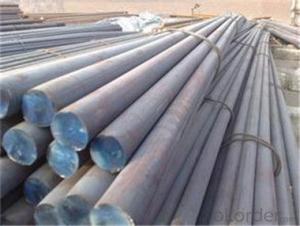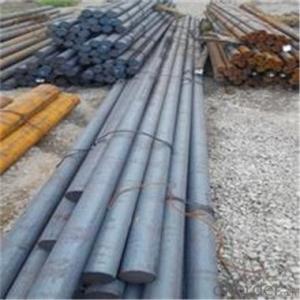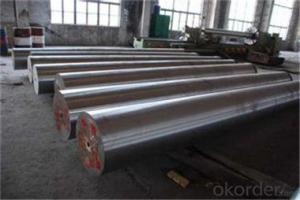Steel Round Bar Reliable Manufacturer with Standard High Quality
- Loading Port:
- Tianjin
- Payment Terms:
- TT OR LC
- Min Order Qty:
- 100 m.t.
- Supply Capability:
- 2000000 m.t./month
OKorder Service Pledge
OKorder Financial Service
You Might Also Like
Description of steel round bar:
Diamater:Ø12mm-Ø650mm
Length: standard 6m,9m,12m, If you need special lengths,please tell us.
Surface: Bare, polished, grinded,varnished
Process:Hot rolled,cold drawn,forged,wrought
Festures of steel round bar:
Inspection: 100% UT test, mill test certificate, third party inspection such as SGS,BV etc.
Packing: In bundle, tied by steel straps, covered with protecting film. Use wooden box, filled with foam to keep the surface from damaging ,scratches,crash etc.
Specifications of steel round bar:
Description | steel round bar | |
Material | ASTM /AISI | 1005,1006,1008,1010,1015,1020,1025,1030,1035, 1040,1045,1050,1055,1060,1065,1070,1080,1084 |
DIN | Ck10,Ck15,Ck22,Ck25,Ck30,Ck35,Ck40,Ck45,Ck50, 30Mn4,40Mn4,1.7225,1.7220,1.7218,1.7016,1.6523 | |
Standard | GB/T799,ASTM A29,A36,A108,A321,A575,BS970,DIN1652,JIS G4051 | |
cross section | Round Other shape:square,hexagonal,flat,angle,rectangular | |
Surface | Black, galvanized,grinded,varnished,bare | |
Specifications | Round bar | Diameter: 12mm~650mm |
Angle bar | Size: 3mm*20mm*20mm~12mm*800mm*800mm | |
Square/ bar | Size: 4mm*4mm~100mm*100mm | |
Flat bar | Thickness: 2mm~100mm | |
Width:10mm~500mm | ||
Hexagonal | Size: 4mm~800mm | |
Length | Standard 6m,9m,12m or as required. | |
Trade terms | Payment terms | T/T,L/C,Western Union,negotiable etc. |
Price terms | FOB,CIF,CFR,EXW etc. | |
Applications | Steel round bar is widely used for all general fabrication and repairs in industrial maintenance, agricultural implements, transportation equipment, ornamental work frame work, braces, supports, shafts,axels,etc. Hot rolled Steel round bars have a slightly grain textured finish. | |
Images of steel round bar:
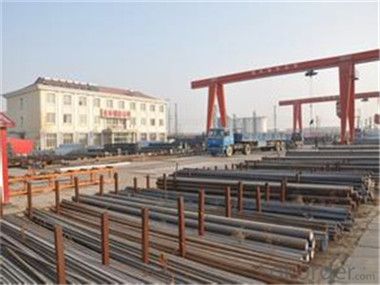
FAQ:
1. What is your package?
Packing situation: standard seaworthy packing or as customer required.
2. How long is the lead time?
Delivery time: 45 days after order confirmed.
3. What payment term do you accept?
Payment: T/T or L/C at sight.
- Q: What are the advantages of using nickel-manganese alloy steel round bars?
- There are several advantages of using nickel-manganese alloy steel round bars in various applications. Firstly, nickel-manganese alloy steel round bars offer excellent strength and toughness. The addition of nickel and manganese enhances the overall strength and durability of the steel, making it suitable for heavy-duty applications that require high strength and resistance to wear and tear. This makes the alloy steel round bars ideal for industries such as construction, automotive, and manufacturing. Secondly, nickel-manganese alloy steel round bars have excellent corrosion resistance properties. The nickel content in the alloy provides exceptional resistance to corrosion, making it suitable for applications in harsh environments or where exposure to corrosive substances is common. This corrosion resistance extends the lifespan of the round bars and reduces the need for frequent maintenance or replacement. Another advantage of using nickel-manganese alloy steel round bars is their excellent heat resistance. The alloy steel can withstand high temperatures without losing its structural integrity, making it suitable for applications that involve exposure to extreme heat or thermal cycles. This heat resistance property makes the round bars ideal for use in industries such as aerospace, power generation, and oil and gas. Furthermore, nickel-manganese alloy steel round bars offer good weldability and machinability. The alloy's composition allows for easy welding and machining, enabling manufacturers to fabricate components or structures with ease. This versatility in processing makes the round bars highly adaptable to different manufacturing processes and requirements. Additionally, nickel-manganese alloy steel round bars have good ductility and formability. The alloy's composition allows it to be easily shaped or formed into various configurations without sacrificing its structural integrity. This formability makes it suitable for applications that require complex shapes or intricate designs. Overall, the advantages of using nickel-manganese alloy steel round bars include excellent strength, corrosion resistance, heat resistance, weldability, machinability, and formability. These properties make the round bars a reliable and versatile choice for a wide range of applications in various industries.
- Q: Are steel round bars suitable for use in the construction industry?
- Yes, steel round bars are commonly used in the construction industry due to their strength, durability, and versatility. They provide structural support in various applications such as reinforcement in concrete, framing, and the creation of beams and columns. Additionally, steel round bars can be easily fabricated, welded, and formed into different shapes, making them a suitable choice for a wide range of construction projects.
- Q: Can steel round bars be used for making fuel system components?
- No, steel round bars are not suitable for making fuel system components as they lack the necessary corrosion resistance and compatibility with fuels.
- Q: Are steel round bars suitable for welding?
- Certainly! Welding can be done with steel round bars, as they possess exceptional strength and durability. These bars are frequently utilized in welding applications due to their excellent properties. One can easily employ a variety of welding techniques, including MIG, TIG, or stick welding, to weld steel round bars. However, it is vital to carefully select the appropriate welding method and consumables based on the specific grade and alloy composition of the bar to ensure a successful weld. To achieve reliable and robust welds, proper surface preparation and cleaning are of utmost importance. All in all, steel round bars are a favored choice for welding projects due to their versatility and ability to endure high temperatures and stress.
- Q: Can steel round bars be used in the agricultural industry?
- Yes, steel round bars can be used in the agricultural industry. They have a wide range of applications in this sector, such as constructing fences, gates, and livestock enclosures. Steel round bars are also commonly used as support and reinforcement in structures like barns, sheds, and agricultural machinery. Their high strength and durability make them ideal for withstanding the harsh conditions and heavy loads typically found in agricultural settings. Additionally, steel round bars can be further processed and fabricated into various agricultural tools and equipment, including hitches, plows, and cultivators. Overall, steel round bars are a versatile and reliable material that can effectively meet the demands of the agricultural industry.
- Q: Can steel round bars be coated?
- Indeed, it is possible to coat steel round bars. Coating them yields numerous advantages, such as enhanced resistance to corrosion, increased durability, and improved visual appeal. The most commonly utilized coatings for steel round bars encompass galvanized coatings, epoxy coatings, and powder coatings. Galvanized coatings encompass the application of a zinc layer onto the steel's surface, which provides exceptional protection against corrosion. Epoxy coatings, on the other hand, find common application in industrial settings due to their remarkable chemical resistance and ability to withstand harsh environments. Powder coatings, involving the electrostatic application of a dry powder, are then cured under heat to form a robust and protective layer. These coatings can be employed on steel round bars to safeguard against rust and other forms of corrosion, thereby rendering them suitable for a broad scope of applications across various industries, including construction, manufacturing, and automotive.
- Q: Can steel round bars be used for making furniture?
- Yes, steel round bars can be used for making furniture. Steel round bars are strong, durable, and have a sleek and modern appearance. They can be used to create various types of furniture, such as tables, chairs, stools, and shelving units. Steel round bars can be welded, bent, and shaped to create unique and custom designs. Additionally, they can be paired with other materials such as wood or glass to create a combination of textures and styles. Steel round bars also have the advantage of being resistant to corrosion, making them suitable for both indoor and outdoor furniture. Overall, steel round bars offer versatility and strength, making them an excellent choice for furniture-making projects.
- Q: Can steel round bars be used in the construction equipment industry?
- In the construction equipment industry, it is common to use steel round bars. These bars are well-known for their strength, durability, and versatility, which makes them suitable for various applications in construction equipment. They can be utilized to produce components like axles, shafts, pins, and fasteners. The robustness of steel round bars guarantees that construction equipment can withstand heavy loads and harsh working conditions. Moreover, steel round bars are easily machinable and weldable, enabling manufacturers to create intricate and customized designs for construction equipment. All in all, due to their exceptional mechanical properties and ability to enhance equipment performance and longevity, steel round bars are extensively employed in the construction equipment industry.
- Q: What are the different types of steel round bar profiles?
- In the market, one can find various steel round bar profiles. Among the most commonly used profiles are: 1. Plain Round Bar: This profile is the most basic and widely used. It consists of a solid cylindrical bar with a smooth surface and a consistent diameter throughout its length. 2. Deformed Round Bar: This type of round bar features deformations or ribs on its surface. These deformations enhance the bond between the bar and concrete, making it ideal for construction applications requiring reinforced concrete structures. 3. Hollow Round Bar: As the name suggests, this profile has a hollow center. It is often utilized in industries where weight reduction is crucial or when the round bar needs to serve as a conduit for fluids or gases. 4. Threaded Round Bar: This profile is characterized by threads along its length, enabling easy screwing into other components. It is commonly employed in applications that require secure fastening or adjustability. 5. Half-Round Bar: With one flat side and one rounded side, this profile takes on a semi-circular shape. It is frequently used in decorative applications, such as handrails, where an aesthetically pleasing appearance is desired. 6. Square Bar: Although not strictly a round profile, square bars are often included in this category. They possess four equal sides and find common use in applications that demand higher torsional strength. 7. Hexagonal Bar: Similar to square bars, hexagonal bars have six equal sides. They are often employed in applications that require high torque resistance or when a distinctive appearance is desired. These represent just a few of the available steel round bar profiles. The selection of a profile depends on specific application requirements, such as structural strength, bonding capabilities, or aesthetic considerations.
- Q: What is the difference between a cold-drawn and a polished steel round bar?
- A cold-drawn steel round bar is typically produced by pulling a hot-rolled bar through a die, resulting in a smoother and more precise diameter. On the other hand, a polished steel round bar undergoes an additional process of grinding or buffing to achieve a smooth and shiny surface finish. While both bars offer improved surface quality, the cold-drawn bar primarily focuses on dimensional accuracy, while the polished bar enhances aesthetics and corrosion resistance.
Send your message to us
Steel Round Bar Reliable Manufacturer with Standard High Quality
- Loading Port:
- Tianjin
- Payment Terms:
- TT OR LC
- Min Order Qty:
- 100 m.t.
- Supply Capability:
- 2000000 m.t./month
OKorder Service Pledge
OKorder Financial Service
Similar products
Hot products
Hot Searches
Related keywords
